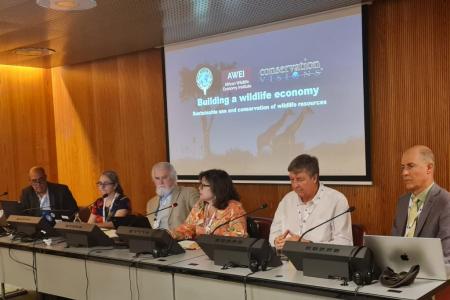
What’s Next For South Africa’s Wildlife Economy? - A Series of Fireside Chats
30 Aug 2021
In July 2021, the African Wildlife Economy Institute (AWEI) in partnership with Oppenheimer Generations Research and Conservation hosted a series of five online Fireside Chats to explore the implications of a recent High-Level Panel Report and Draft Policy Position from the South African Department of Forestry, Fisheries, and Wildlife for the wildlife economy.
Commenting on the Report, H.E. Ms Barbara Creecy, Minister of Forestry, Fisheries & the Environment, stated that:
“Besides providing specific interventions to resolve key issues in the sector, the report also provides for a re-conceptualized wildlife sector, that will provide a new deal for people and wildlife in South Africa.”
How will the recommendations of the HLP Report and the Draft Policy Position affect the future of the country’s wildlife economy?
Will the proposed policies “provide policy certainty and a stable base for conservation, growth, and development;” and will they “initiate transformation of the sector?”
The video recordings of the 4 chats are now available. Please click on the links below:
AWEI Fireside Chats |
Date |
|
Tue, 13 July |
|
|
Protected areas as drivers of local and regional rural economies |
Thu, 15 July |
|
Developing a standard for responsible and sustainable hunting |
Tue, 20 July |
|
Thu, 22 July |
|
|
Tue, 27 July |
If you are interested in further research or fireside chats on the wildlife economy, please contact: Francis Vorhies, AWEI Director
We support the free flow of information. Please share:
More content
-

Drivers of hunting and photographic tourism income to communal conservancies in Namibia
Mr Joseph Goergen …Hunting and photographic tourism provide ecosystem services that can facilitate conservation. Understanding factors influencing how tourism industries generate...
2024Research -

SANParks Vision 2040: A New Era for Conservation in South Africa
Mrs Emily TaylorReimagining Conservation: SANParks' Vision 2040
South African National Parks (SANParks) has unveiled its ambitious Vision 2040, a…
Articles -

In defence of wild meat’s place at the table
Tim VernimmenQ&A — Conservation scientist E.J. Milner-Gulland
Sustainable and safe consumption of wildlife is possible, and important for those…
Articles -

The diverse socioeconomic contributions of wildlife ranching
Candice Denner…The diverse socioeconomic contributions of wildlife ranching are increasingly recognized as a vital element of sustainable development, particularly...
2024Research -

A conflict of visions: Ideas shaping wildlife trade policy toward African megafauna
Mr Michael 't Sas-Rolfes…The issue of wildlife trade is a major concern for the conservation of African megafauna, such as elephants...
2024Research -

Barriers to the Participation of the Traditional Leadership Institution in Promoting Rural Agricultural Development
Dr Wiseman Ndlovu…The Traditional Leadership Institution (TLI) is constitutionally recognised to promote rural development in South Africa. It works with...
2022Research -

Elephant in the Room - Why a trophy hunting ban would hurt conservation and development
Dr Francis Vorhies“Trophy hunting, if well managed, conserves wild species and habitats and enhances livelihoods in rural communities.” - Dr...
2024Briefs -

Biodiversity means business: Reframing global biodiversity goals for the private sector
Dr Francis Vorhies…The Convention on Biological Diversity strategic goals direct the conservation and sustainable use of biodiversity from global to...
2019Research -

The 33rd Meeting of the Animals Committee of the Convention on International Trade in Endangered Species of Wild…
Articles
Get updates by email
Through impactful research, stakeholder engagement, and professional development, AWEI is supporting the wildlife economy across Africa. Please subscribe for occasional updates on our work and forthcoming events.
Sign up for a quarterly dose of AWEI insights
In a complex and changing world, AWEI generates strategic ideas, conducts independent analysis on wildlife economies, and collaborates with global scholar-practitioners to provide training and expertise for biodiversity conservation, climate resilience, and inclusive economic opportunities in Africa.
